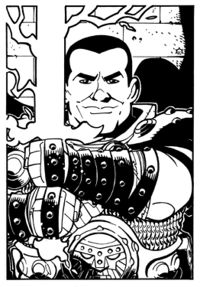User:Wizardoest/PCs/Wolfdale (Ludhumus)
Rebuild as Alchemist 2/Barbarian 3 with STR: 16 DEX: 12 CON: 12 INT: 16 WIS: 8 CHA: 8
Wolfdale

Ranger 3
CG Medium Human
Faith Venal, goddess of home and hearth
Init +4
Defense
AC: 20; Touch: 12; Flat-footed: 18
(+2 dex, +6 chainmail, +2 scizore)
HP: 29 (3d10+3+3[favored ranger])
Fort: +4, Ref +5, Will +2
Offense
Speed: 20' (30')
Melee (Standard): Scizore, mw +5 (1d10+2 ×2)
Melee (Full): Scizore, mw +3 (1d10+2 ×2) and Shortsword +3 (1d6+1 19×2)
Ranged: Javelin +5 (1d6+2 ×2 30')
Space: 5'; Reach: 5'; BAB: +3;
Combat Maneuver Bonus: +5 Combat Maneuver Defense: 17
Stats
Abilities STR: 14 DEX: 15 CON: 12 INT: 10 WIS: 10 CHA: 10
Feats Hu: Improved Shield Bash (retain AC when attacking); 1: Two-weapon Fighting; R2: Shield Slam; 3: Shield Focus; R3: Endurance
Skills 21 Skill points. ACP: -7 (5 armor, 2 shld)
Languages Common
Abilities
Active
- Favored Enemy (Animals)
- +2 bonus on Bluff, Knowledge, Perception, Sense Motive, and Survival checks against creatures of his selected type. Likewise, he gets a +2 bonus on weapon attack and damage rolls against them. A ranger may make Knowledge skill checks untrained when attempting to identify these creatures.
- Wild Empathy
- A ranger can improve the initial attitude of an animal. This ability functions just like a Diplomacy check to improve the attitude of a person (see Using Skills). The ranger rolls 1d20 and adds his ranger level and his Charisma bonus to determine the wild empathy check result. The typical domestic animal has a starting attitude of indifferent, while wild animals are usually unfriendly.
- To use wild empathy, the ranger and the animal must be within 30 feet of one another under normal visibility conditions. Generally, influencing an animal in this way takes 1 minute, but, as with influencing people, it might take more or less time.
- The ranger can also use this ability to influence a magical beast with an Intelligence score of 1 or 2, but he takes a –4 penalty on the check.
- Shield Slam (with Scizore)
- Any opponents hit by your shield bash are also hit with a free bull rush attack, substituting your attack roll for the combat maneuver check. This bull rush does not provoke an attack of opportunity. Opponents who cannot move back due to a wall or other surface are knocked prone after moving the maximum possible distance. You may choose to move with your target if you are able to take a 5-foot step or to spend an action to move this turn.
Passive
- Weapon and Armor Proficiency
- A ranger is proficient with all simple and martial weapons and with light armor, medium armor, and shields (except tower shields).
- Scizore
- The scizore grants a +1 shield bonus to AC, but if you attack with the blade, you lose the AC bonus that round and take a –1 penalty on attack rolls with the scizore. While wearing a scizore, you cannot use that hand for anything else. A scizore provides a +10 bonus to your CMD against being disarmed of your scizore. Donning a scizore is a full-round action.
- Track (+1 bonus already added to skill)
- Endurance
- You gain a +4 bonus on the following checks and saves: Swim checks made to resist nonlethal damage from exhaustion; Constitution checks made to continue running; Constitution checks made to avoid nonlethal damage from a forced march; Constitution checks made to hold your breath; Constitution checks made to avoid nonlethal damage from starvation or thirst; Fortitude saves made to avoid nonlethal damage from hot or cold environments; and Fortitude saves made to resist damage from suffocation. You may sleep in light or medium armor without becoming fatigued.
- Indomitable Faith (Trait) +1 to Will saves
- You were born in a region where your faith was not popular, yet you never abandoned it. Your constant struggle to maintain your own faith has bolstered your drive.
- Reactionary (Trait) +2 to Initiative
- You were bullied often as a child, but never quite developed an offensive response. Instead, you became adept at anticipating sudden attacks and reacting to danger quickly.